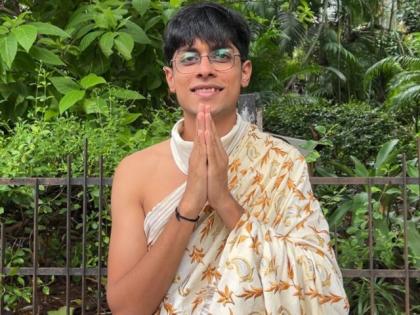"In a World Chasing More, Paryushan Teaches Us the Beauty of Less": Divya Fofani
By Lokmat Times Desk | Updated: August 28, 2025 16:53 IST2025-08-28T16:52:22+5:302025-08-28T16:53:26+5:30
In a world driven by materialism and constant noise, the ancient Jain festival of Paryushan offers a rare moment ...

"In a World Chasing More, Paryushan Teaches Us the Beauty of Less": Divya Fofani
In a world driven by materialism and constant noise, the ancient Jain festival of Paryushan offers a rare moment of stillness, reflection, and spiritual renewal. With the “Paryushan” series, creator Divya Fofani has reimagined this sacred time by inviting non-Indians to live like monks for a day. The goal? To bridge cultures, celebrate Indian values, and share the timeless wisdom of Jainism with the world—one mindful step at a time. In an exclusive interview with Lokmat Times, Divya opened up about the inspiration behind the series, the surprising global resonance of Jain values, and how a simple day of monastic living is helping foster unity in an increasingly divided world.
What inspired you to create the "Paryushan" series, and why did you choose to invite non-Indians to experience a day as a monk?
Being a Jain myself, I have been practicing this life and celebrating Paryushan since childhood. My family always celebritrated Paryushan with a lot of enthusiasm since I was a kid and taught me everything about it. Non-Indians who don't know anything about our culture were invited to learn and live like a monk because they would have never seen or heard about this life. Their culture, lifestyle, values are so different so I thought why not make them experience this side of life as well, and not only that but a thought was also to celebrate India and Indian culture because often times we are influenced by the West but it's high time we embrace our culture and launch our soft power to the world. India to the World and our values and lessons should be spread all across the globe.
In the context of your "Paryushan" series, what do you believe is the most transformative lesson someone from a different cultural or spiritual background can learn by stepping into the monastic lifestyle for a day?
The most transformative lesson someone from a different cultural or spiritual background can learn by stepping into the monastic lifestyle for a day is the power of letting go. In Jain tradition, Paryushan teaches us that true strength lies not in accumulation, but in renunciation — whether that means detaching from material possessions, releasing grudges through forgiveness, or silencing the constant noise of daily life. What I’ve seen is that even for those unfamiliar with Jainism, this experience sparks a deep sense of clarity and balance. It shows them that spirituality isn’t about rituals alone, but about universal human practices — slowing down, reflecting inward, and finding peace in simplicity. That realization, I believe, is what makes the experience profoundly transformative.
From the responses and engagement you've received so far, what has surprised you the most about how non-Indians are connecting with the practice of monastic life during Paryushan?
What really surprised me is that non-Indians, who don’t share the cultural or religious background, still found deep meaning in Jain monastic practices. Many related it to concepts they’re already exploring — minimalism, mindfulness, sustainable living, even meditation. It made me realize that while Paryushan is a very Indian festival, its essence — simplicity, forgiveness, reflection, and detachment — is something that speaks to people everywhere. In a way, their reactions showed me that the values we practice during Paryushan are not bound by geography or religion, but are actually universal human needs.
How do you think immersing people from different cultural backgrounds in the monastic lifestyle can impact their understanding of spirituality and mindfulness?
I have always believed and considered pratical experiences are better than theory. Instead of preaching different lifestyles, reading about it or hearing podcasts about it - one should focus on having real life experiences like these. To immerse yourself fully in an experience like living a monk life teaches you so many things in ways you would never imagine. A habit, a ritual a learning during the experience might stick with you throughout your life and change you completely.
In your opinion, what are the most significant takeaways for people from other countries after spending a day in the shoes of a monk, especially in the context of fostering unity and diversity?
For people from other countries, spending even a single day in the shoes of a monk during Paryushan has been a powerful reminder that at our core, human values are universal. Stripped of distractions, many realized how liberating simplicity can feel, and how forgiveness and reflection are practices that transcend culture or religion. What struck me most was how this experience didn’t divide people by background but united them through shared emotions — the need for peace, the desire to let go of grudges, and the joy of living with less. In a world that often feels fragmented, Paryushan becomes a bridge, showing that diversity doesn’t have to mean distance. Instead, it can spark conversations, empathy, and a deeper sense of unity that connects us all.
Open in app